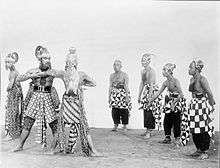Punokawan

In Javanese wayang (shadow puppets), the panakawan or panakavan (phanakavhan) are the clown servants of the hero. There are four of them – Semar (also known as Ki Lurah Semar), Petruk, Gareng and Bagong. Semar is the personification of a deity, sometimes said to be the dhanyang or guardian spirit of the island of Java. In Javanese mythology, deities can only manifest themselves as ugly or otherwise unprepossessing humans, and so Semar is always portrayed as short and fat with a pug nose and a dangling hernia.
His three companions are his adopted sons, given to Semar as votaries by their parents. Petruk is portrayed as tall and gangling with a long nose, Gareng as short with a club foot and Bagong as obese.
The panakawan always appear in the second act of a wayang performance – pathet sanga – as servants to the hero of the story regardless of who that hero is.
Similar characters appear in other Indonesian wayang and theatrical traditions, including those of Bali and Sunda, under different names.
The panakawan characters are generally much-loved by audiences who attend wayang plays in Indonesia and their appearance in the plays is usually greeted with laughter and anticipation.
References
Further reading
- Brandon, James (1970). On thrones of gold - three Javanese shadow plays. Harvard University Press.
- Keeler, Ward (1987). Javanese Shadow Plays, Javanese Selves. Princeton University Press.
- Keeler, Ward (1992). Javanese Shadow Puppets. OUP.
- Long, Roger (1982). Javanese shadow theatre: Movement and characterization in Ngayogyakarta wayang kulit. Umi Research Press.
External links